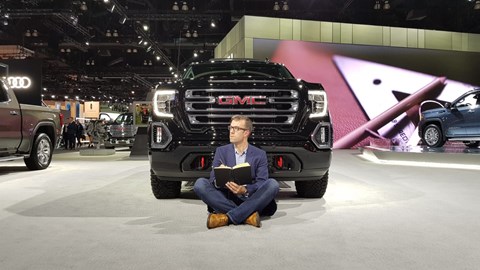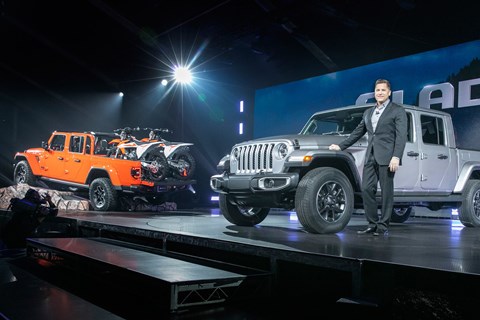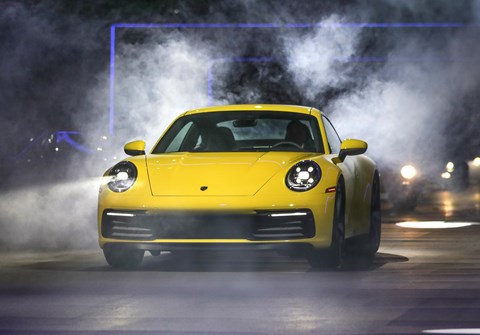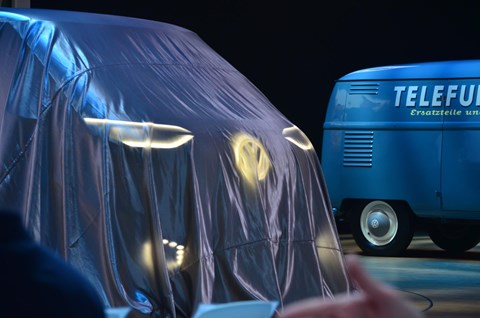► Los Angeles Auto Show 2018
► Motor show report and analysis
► Showgoer Tim Pollard reflects
The roads circling the Los Angeles Convention Center are choked with dense traffic round the clock: cars and trucks of all shapes and sizes sprawl across suburban roads and freeways, often stretched over three, four or five lanes. Few cities are as addicted to the car as LA. The growing band of Teslas and compact cars remain outnumbered by a surfeit of large and louche, thirsty and dirty vehicles with multi-cylinder power encouraged by cheap gas prices.
Evidence seen by your eyes sits uncomfortably with the pious messages of change echoing in your ears within the motor show halls. Therein lies the rub. The automotive industry is undergoing a revolution at its very core, but at what pace and scale in the real world remains to be seen.

If you had a dollar for every chief executive who stood up and espoused their electrification* ambitions in front of gathered crowds, you’d be jostling with Elon Musk for position on the rich list.
* Substitute electric for digitisation/autonomous/connected/sharing as appropriate
This disconnect is keenly felt at the 2018 Los Angeles Auto Show. Some brands embrace the revolution wholeheartedly and with conviction (that’s you outdoorsy EV start-up Rivian and Byton… and Toyota too); while others look like they’re barely paying it lip service (that’s the domestic ‘Big Three’).

To observe this is to witness free market economics in full flight. Stateside customers still want their pick-ups and utes – and this is exactly what the industry is serving up. Analysts report that truck sales are rising in the US, now accounting for nearly one in five sales in 2018. A truck like the new Jeep Gladiator (above) is neatly executed, if lacking in outright flair to these eyes, although CAR’s staff writer Jake Groves reported back in gushing terms, lauding the application of the Jeep tracksuit to the boxiness of utility. It’s coming to Britain in right-hand drive too, further underlining the growing popularity of flatbeds in Europe.
The Ford F series remains America’s bestselling vehicle, shifting 900,000 units last year and the Blue Oval recently declared its intention to stop building conventional cars in the US in favour of more SUVs and trucks. So we were disappointed by the lack of ambition from Ford, Chrysler and GM to break the mould at LA 2018. Perhaps they’re too busy deflecting Trumpian presidential sleights to remember to show up, although behemoths like the newly hybridised Lincoln Aviator show that the oil tankers are turning, slowly.
Sizzle still sells in LA: new Porsche 992 steals the show
If judged in outright popularity on our website and among correspondents’ chatter on the show floor, the new, 992-era Porsche 911 (below) was arguably star of the show. Such mystique has built up around the iconic sports car in its five and a half decades on sale that its launch attracted a revere rarely experienced for expensive performance metal.

The new one is delicately judged: same-again looks tightened just enough to provide modernity against the backdrop of glacial evolution. That’s just the way fans like it. But its heart – the mechanical package and digital innards – have been wholeheartedly updated, with half an eye on greater performance and half on more responsible fun. It’s a recipe likely to resonate with users, though the growth spurt continues to worry.
Sparking up: electric revolution
The aftershocks of Dieselgate continue to be felt and the two other arms of the Volkswagen Group delivered on-brand, all-electric messages. Audi’s E-Tron GT is a thinly veiled production car, stretching the E-Tron SUV electric gene pool across to a more A7-alike, elegant four-door coupe. Think Ingolstadt’s Porsche Taycan and you’re there.
Meanwhile the Volkswagen ID Buzz Cargo (below) was reworked into a motorsport support van, the inherent flexibility of its MEB electric architecture plain to see. VW claimed 11.7 billion packages were delivered in the US last year, accounting for nearly a tenth of road traffic in urban areas.

This explains why Volvo – which controversially had no cars on its stand at all on press day (they’ll be wheeled back out for public days) – was focusing instead on its connected services and partnerships. It now offers Amazon drop-off to your car boot in 37 US cities, giving a glimpse into the future internet of things. Its innovation officers took to the stage to explain how subscribing to Volvos will become the norm in the next decade and talked us through some of the joined-up thinking that’ll embed the car ever more deeply into our digital lives.
It was a story repeated over at BMW, whose in-yer-face iNext and X7, both making their public debuts, deliberately provoked stylistic uproar, the better to draw attention to their autonomous intent and interior creds.
Asia fights back
If Europe’s car makers generally led the conversation at LA, brands from Japan and Korea weren’t far behind. Kia showed off the new Soul (now a pure electric car only in the UK) and Honda launched the new Passport, a cool-looking SUV that could tempt you were the CR-V too sensible for your tastes. Toyota proved yet again that it’s one step ahead by launching a new electric AWD version of its evergreen Prius range, adding grip to godliness.

But it was perhaps little old Mazda who made the biggest impact. We’ve long admired the quiet neatness of the current range – a wholesome, homogenous family whose brand values are shot through everything from humble 2 to 6, from the tidy crossover range to the still-fizzy MX-5. They’ve bravely decided to keep pushing the boat out and the new Mazda 3 (above) is the first product of the new Kodo v2 mantra. That it also debuts the technically mould-breaking SPCCI petrol compression ignition engines makes it all the smarter and innovative.
If more brands were as brave and honest and pioneering like Mazda, it’s likely that the world’s car industry would be in a better place. And the freeways circling LA would look way more progressive and in tune with the challenged global zeitgeist.
Don’t miss all the cars that matter from the 2018 LA Auto Show in our handy guide here